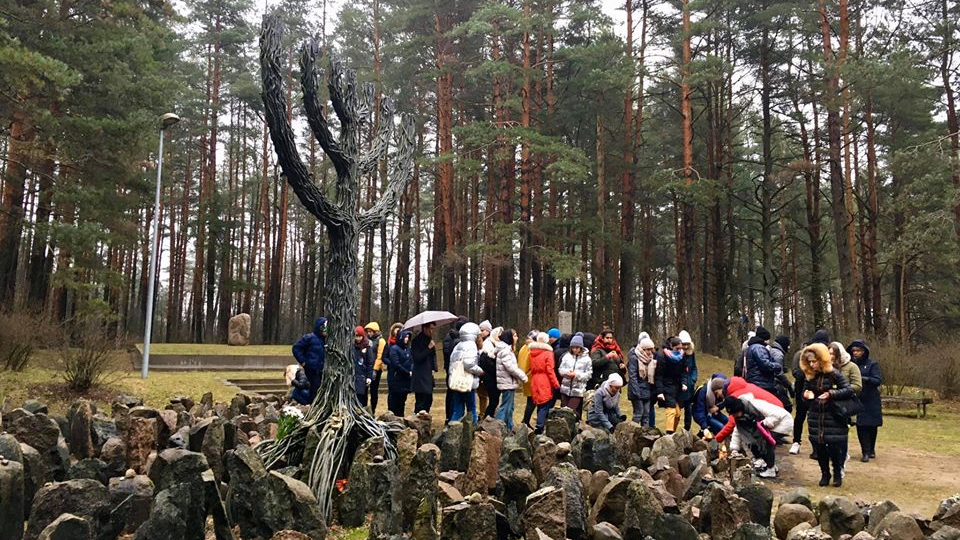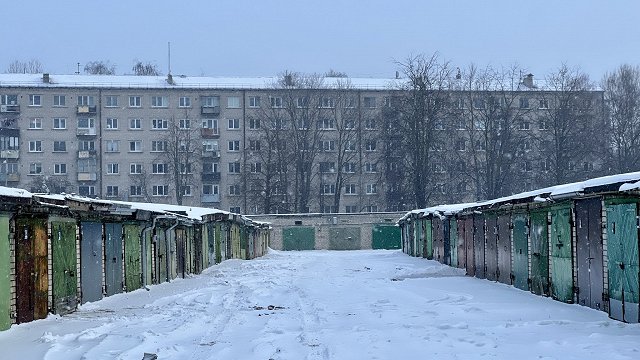The largest mass murder in the history of Latvia was organized and planned by Friedrich Jeckeln, a high-ranking SS officer acting under orders from Berlin.
The people of the Rīga Ghetto were chased from their homes and force-marched to the Rumbula forest by Latvian and German SD units, including the infamous Arajs Kommando squad. Latvian auxiliary police kept watch over the marchers.
Those who tried to hide or resist - or were simply walking too slow - were shot either in the Ghetto or on the way to Rumbula. In the forest the victims were stripped of their personal belongings and were told to remove their clothes and lie down in the previously dug mass graves.
Afterwards the people lying on the graves of their relatives and peers were shot by the German SD and members of the Einsatzgruppe.
A week later on December 8 Latvian and German SD units continued to look for and kill Jews that had been able to hide within the bounds of the Ghetto.
The men and women – brothers, sisters, mothers, daughters, fathers, grandchildren, sons, grandfathers, grandmothers, friends, husbands, wives, neighbors – killed in Rumbula were people just like us.
They were Latvian people because Latvia was their motherland. They were Latvian people because the Latvian soil became their grave.
Nowadays the people who died at Rumbula are commemorated each November by Latvian Jews and their friends, as well as a few historians, researchers and museum employees. Last year was the first time the highest-ranking state officials took part in such events. The public at large are reminded about the events by a newspaper headline or two, or a title of a documentary in the TV guide.
But who in our age has the time to read the articles and watch the films? Life is, as they say, short, but history is long; furthermore, there are so many memorial days in Latvia. It is, besides, difficult to talk about Rumbula. Even though no historian doubts the participation of the Arājs Kommando and the Latvian auxiliary police in the atrocities, the public has difficulty grasping, accepting and most of all discussing the fact.
Just recently, commenting on a Facebook post calling on people to remember Rumbula, an infuriated compatriot asked why people are asked to remember the Jews murdered by the Nazis but not the Latvians killed by the communists. Everyone has their own dead to mourn, after all.
And so we keep silent and turn away, just like so many did in 1941 upon seeing thousands of people marched towards Rumbula. The difference is that, in contrast to our grandparents and great-grandparents we're not forced to keep silent and turn away by a foreign power that has occupied Latvia.
In our country we're free to remember everyone we've lost. Our historical memory is not a competition in which the people killed in Rumbula and those taken to Siberia are fighting for five minutes of our precious time.
Our compassion and pain is not money, which, if given to one cause, will leave none for the other.
Arājs and his squad don't make us a nation of murderers, just like Žanis Lipke and other saviors of the Jews don't make us all heroes. It's only we who can define ourselves.
By commemorating Lipke and 270 other saviors of the Jews we acknowledge that our heroes are people who were truly committed to love their neighbors as they love themselves and give their lives up for them. By turning away or keeping an awkward silence about an atrocity just because it has been accomplished by Latvians or with the help of Latvians, we debase both our nation and ourselves.
Arājs and his squad were collaborators who betrayed the state and helped a foreign power murder Latvian citizens. We're not responsible for their crimes, but we are responsible for our attitude towards them.
The 25,000 murdered Latvian Jews were our own people. They were part of the Latvian nation, which is referred to by Article 2 of the Constitution. They took part in the war for freedom, they helped build Latvia, and they were Latvia. The Jews who died in Rumbula after being taken here from other parts of the Reich are our own people too. And not just because they were murdered on Latvian soil. They are our own people as we are all human. We could not save their lives but we can protect their memory.
On August 29, 2016 Lithuania remembered the Jews killed 75 years ago at the Molėtai town. More than 3,000 people – students, schoolchildren, Lithuanian army officers, activists, Catholic Church representatives, families with children, the state president – partook in the commemoration walk to the place where mass murders were committed.
The event was started by Lithuanian director Marius Ivaškevičius, who wrote in the invitation to the event: "Let's visit those who have been waiting for us for three quarters of a century. I believe they knew that a day will come when Lithuania will return to them. And they will return to Lithuania, because Lithuania was their home – their only home."
The time has come for us too to call home the people whom our grandparents and great-grandparents saw leaving 75 years ago. On November 30, 2016 let's light candles by the Freedom Monument so that they can, through the darkness of the century, find their way to the Fatherland from which they were taken and to the Freedom that was denied to them.
NOTE: This piece was originally published in 2016. Since then, the tradition of lighting candles at the Freedom Monument to remember victims of Rumbula has gained considerably in popularity.






























